Introduction to the Undergraduate Programme
Electrical & Electronics Engineering (EEE) program is a rising and one of the most required programs in the field of engineering. EEE program is an integrated branch of electrical and electronic engineering. The electrical engineering is the origin of this program. Understanding of circuits and computerized devices is necessary in electrical & electronic field to compete with the technical modernization and computerization at work field of the world. This program covers the concept of power generation & distribution, machine control, communication, renewable and storage systems. In SETGOI this program is structured to make undergraduate students to understand the technological aspects of electrical circuitry and its application in electrical equipments. To achieve this, EEE program undergoes many additional departmental level programs like case studies, innovative mini-projects, covering subject gaps, student’s seminars, group discussions and Technical quizzes. The seminars /webinars are organized where students can discuss with an industrial or research experts about the practical implementation and current issues of their subject topics.
Who is the Programme for?
The programme is designed for those who are interested to make a career in-
| Major Career Opportunities | Higher Education Opportunities | Alternative Career Options |
|---|---|---|
|
|
|
Curriculum Structure
| Sl No. | Category | Breakup of Credits | Credit Distribution % |
|---|---|---|---|
| 1. | Humanities & Social Sciences + Management Courses | 12 | 7.5 |
| 2. | Basic Science Courses | 25 | 15.625 |
| 3. | Engineering Science Courses | 23 | 14.375 |
| 4. | Professional Core Courses | 59 | 36.875 |
| 5. | Project / Internship | 11 | 6.875 |
| 6. | Professional Elective Courses | 15 | 9.375 |
| 7. | Open Elective Courses | 15 | 9.375 |
| 8. | Mandatory Courses | 0 | 0 |
| Total Credits | 160 | 100 | |
Curriculum Details
Laboratories
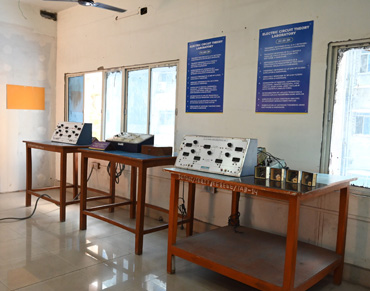
Circuit Theory Laboratory
The experiments in this lab link the circuit theory course to motivate the students for learning theory concepts through practical activity......

Circuit Theory Laboratory
The experiments in this lab link the circuit theory course to motivate the students for learning theory concepts through practical activity. Thus understanding the circuit functioning related to AC and DC circuit parameters, circuit components and theoretical laws are the main objectives of the Circuit theory lab.
LIST OF SOFTWARE
- MATLAB 13b
- PSPICE Student 9.1
- PSIM 9.3
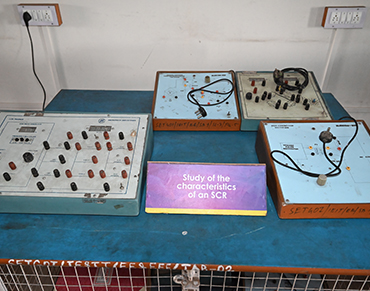
Measurement Laboratory
In this lab students get experience on various electrical measurements and testing. Students are can perform experiments on various working principle......

Measurement Laboratory
In this lab students get experience on various electrical measurements and testing. Students are can perform experiments on various working principles of measuring bridges and instruments. Experiments cover illustration of the principles of electrical & electronic measuring instruments and their limitations. They can perform error analysis with the help of standard instruments.
LIST OF SOFTWARE
- MATLAB 13b
- PSPICE Student 9.1
- PSIM 9.3
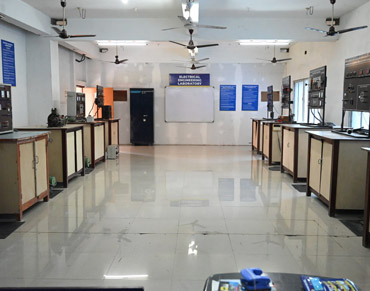
Electrical Machine Laboratory
The Electrical Machine Laboratory is an important Laboratory for Electrical Engineering students. This Laboratory is......

Electrical Machine Laboratory
The Electrical Machine Laboratory is an important Laboratory for Electrical Engineering students. This Laboratory is equipped with different AC and DC Electrical Machines, Transformers and Electrical & Electronics measuring equipments. This Laboratory enables undergraduate students to understand the modelling and working of conventional and special Electrical Machines easily. Also, the Laboratory is involved with various research activities and project works.
LIST OF SOFTWARE
- MATLAB 13b
- PSPICE Student 9.1
- PSIM 9.3
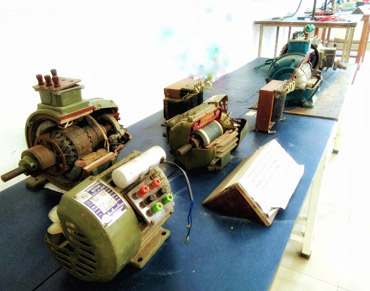
Electrical Machine Design Laboratory
The Machine Design Laboratory contributes to educate the undergraduate student in the field of Electrical Design of a Machine.......

Electrical Machine Design Laboratory
The Machine Design Laboratory contributes to educate the undergraduate student in the field of Electrical Design of a Machine. The mission of this lab is to understand the design concepts of components of electrical machine. The machine design includes learning design methodology and computer-aided design software systems which help electrical machine companies to rapidly develop high quality new products.
LIST OF SOFTWARE
- MATLAB 13b
- PSPICE Student 9.1
- PSIM 9.3
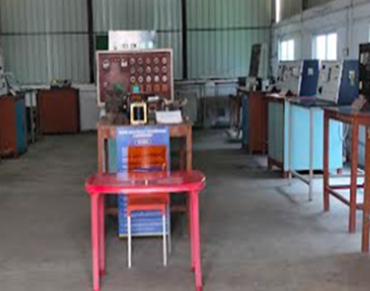
Power System Laboratory
In Power Systems Lab students becomes familiar with electrically-operated control equipments and protective devices of power system........

Power System Laboratory
In Power Systems Lab students becomes familiar with electrically-operated control equipments and protective devices of power system. Here students can get the overall view of generation transmission distribution sections of power system. Students can understand the locations and applications of electric generators, transformers and electric motors. Students get training on computer simulation for power flow, dynamic characteristics and stability studies of power system.
LIST OF SOFTWARE
- MATLAB 13b
- PSPICE Student 9.1
- PSIM 9.3

Power Electronics Laboratory
Power Electronics laboratory is used by UG students to follow the course Power Electronics Converters more deeply.........

Power Electronics Laboratory
Power Electronics laboratory is used by UG students to follow the course Power Electronics Converters more deeply. This lab consists of oscilloscopes, function generators, multimeters, soldering arrangements, LCR meters and power electronic components (viz. diac, triac, thyristors and UJTs) to carry out experiments. This laboratory is to impart practical knowledge of power electronic components and their applications.
LIST OF SOFTWARE
- MATLAB 13b
- PSPICE Student 9.1
- PSIM 9.3

Control System Laboratory
In Control System lab students acquainted with design of control circuit and different control parameters. Students understand the.........

Control System Laboratory
In Control System lab students acquainted with design of control circuit and different control parameters. Students understand the operation of various control strategies through computer simulation. The control signals variations and system stability with the variation of control parameter helps the students to understand the basic concepts of control system.
LIST OF SOFTWARE
- MATLAB 13b
- PSPICE Student 9.1
- PSIM 9.3

Electric Drives Laboratory
The Electric Drives Laboratory is a learning/research laboratory for Electric Drives and Renewable Energy. This .........

Electric Drives Laboratory
The Electric Drives Laboratory is a learning/research laboratory for Electric Drives and Renewable Energy. This laboratory is developed to deliver hands-on experiments and projects in electric machines, power electronics, electric drives, circuits, power system and renewable energy. The students become proficient in the use of industry-standard tools for electric drives simulation.
LIST OF SOFTWARE
- MATLAB 13b
- PSPICE Student 9.1
- PSIM 9.3
Activity gallery
Career Guidance & Mentoring
- Faculty Mentor monitors the personal and professional development of individual student mentee.
- Guides curricular, co-curricular and extra-curricular activities.
- Mentor establishes a personal relationship and addresses the various issues of the student.











